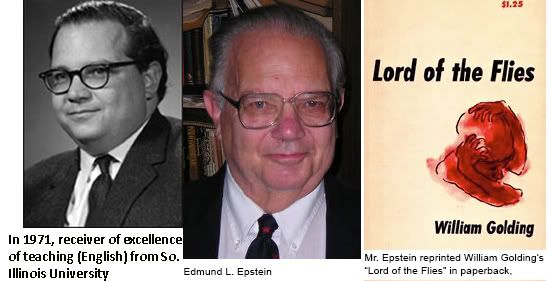Edmund Epsten recently passed away. An excerpt
from the nytimes
Edmund L. Epstein, Scholar Who Saved ‘Lord of the Flies,’ Dies at 80
By BRUCE WEBER
Edmund L. Epstein, a literary scholar who, as a book editor in the late 1950s, was so taken by a well-reviewed but not especially popular first novel by a largely unknown British writer that he decided to reprint it in paperback, thus enabling the extravagant American success of “Lord of the Flies” and its author, the future Nobel Prize winner William Golding, died on April 1 in Melville, on Long Island. He was 80.
The cause was complications of multiple myeloma, his daughter Dr. Lucy Hutner said.
Mr. Epstein, who taught at Queens College of the City University of New York for many years , was a Joyce scholar and the author of influential book-length studies of Joyce’s “Portrait of the Artist as a Young Man” and “Finnegans Wake.” He was also a founder, in 1957, of the James Joyce Review, a short-lived journal that was an important antecedent of the James Joyce Quarterly, which was founded in 1963 and to which he contributed.
“Professor Epstein helped shape the field for nearly two generations across a range of essays covering all of the Joyce canon,” the Quarterly wrote in an obituary on its blog.
In 1957, Mr. Epstein became the editor of Capricorn Books, an imprint of G. P. Putnam’s Sons (now owned by the Penguin Group) aimed at the college market.
“Lord of the Flies,” the allegorical tale of well-brought-up British boys who, left to their own devices on a remote island, devolve into savagery, had been published in England in 1954. The next year, after being rejected by a number of prominent American houses, it was published in the United States by Coward-McCann (also owned by Putnam’s and later known as Coward, McCann & Geoghegan) in a hardcover edition. It sold poorly. But Mr. Epstein was one of its select readers.
a story from 2006 about a lecture he gave in Port Washington
Joan Kent, former president of the Library Board of Trustees and also of the Library Foundation, talked with Professor Epstein at the conclusion of the program. Photo by Will Wright
Queens College Professor of English and Port resident Edmund Epstein recently lectured at the library on the subject "What, exactly, is a Classic?" This well-attended event, sponsored by the Friends of the Port Washington Library, commemorated the fifth anniversary of the creation of the Ruth D. Bogen memorial collection and the purchase of the 1,000th volume under its aegis.
Prof. Epstein, a neighbor and friend of Ruth Bogen, began his thought-provoking remarks by commenting, "Ruth was one of the classiest people I knew. She was a classics major in college and member of our reading group for a long time. She never let us get away with anything. Sam [Bogen], too."
Epstein said, "This question of what is a classic turns out to be a very complicated business." He traced the meaning back to the ancient Romans, where it meant those at the top and later best in category, through the Middle Ages where it meant in the classical tradition of Greek and Rome, to modern times. He pointed out that the word has now and has had many different meanings. He said, "I began to work in a different idea of what a classic is. If you look at the functions of language, the main thing is that they assert things about the outside world." He added that language is our way of trying to make sense of the things in the world that we see. "I am making sense of the world through my brain," he said "It's a way of solving problems." Literature, he commented, is a society's way of solving puzzles that have not been solved by individual members. "It is classic because it is preserved and it is preserved until the puzzle is solved." Epstein said that his definition of a classic is not limited to literature-it applies to the visual arts, science, history, music, and other fields as well.



























No comments:
Post a Comment